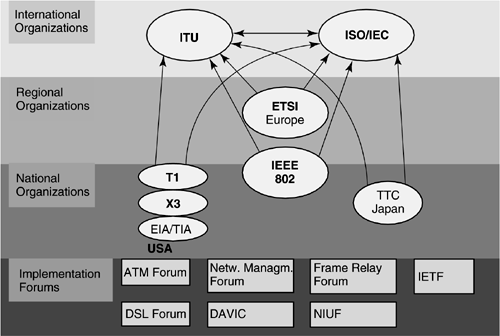Chapter 17. Standards
The development of standards was much simpler when telecommunications networks were solely provided by state-run phone companies (PTTs) and regulated monopolies such as the predivestiture AT&T. There was one central planning organization that dictated the standards. When a standard is developed privately by one or a few companies who have sufficient dominance to control market adoption, it is called a de facto standard. Today, most standards are developed by committees with hundreds of companies and diverse interests. The standards developed by recognized open and fair standards bodies are called de jure standards. The standards arena contains international organizations such as the International Telecommunications Union (ITU), the International Standards Organization, and the International Electrotechnical Commission (ISO/IEC), which address the harmonization of standards for nearly all countries. The European Telecommunications Standards Institute (ETSI) addresses standards for its member countries . The IEEE, originally a U.S. “dominated organization, is now becoming more internationally focused. National standards for the United States are developed by the Electronics Industry Association/Telecommunications Industry Association (EIA/TIA) and the American National Standards Institute (ANSI) accredited Committees T1 and X3. TTC develops standards for Japan. Implementation forums have been formed to quickly address specific topics. The many standards organizations that do not have direct bearing on DSLs are not shown in Figure 17.1. Figure 17.1. Relationship of industry standards organizations. |
| Top |
EAN: 2147483647
Pages: 154
